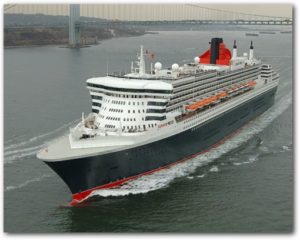Cruise Industry vs. the Volcano
By: Liam P. Cusack,
Editor
New York, NY
The Icelandic volcano has caused merely a ripple in the ocean of the cruise industry. That could change this summer as many lines reposition their ships for the summer European tourist season As of the date of this posting, none of the major cruise lines have altered their schedules for summer Northern European; European; and Mediterranean cruises.
Cruise lines however are making sure passengers realize ahead of time that the linewill not be held responsible for airline cancellations and are urging passengers to purchase trip cancellation insurance.
The volcanic ash gave the cruise industry status that cruise lines have not had in more than forty years as cruise ships and ocean liners became the only form of tourist transportation moving between North America and Europe.
Cunard Line reported that their reservation center received three times the number of calls they usually receive as travelers found any way possible to travel between Europe and North America. The wait list for the Queen Mary 2’s April 22 transatlantic crossing from Southampton exceeded 1,000 bookings.
The crisis did not impact cruise ships’ ability to sail, but passengers faced tremendous obstacles in getting to the vessels, and home from them.
The ash began raining on Europe just as the cruise season began, meaning many ships were already sailing to Europe or were already posted at their summer European ports.
Royal Caribbean International said the volcano disrupted 6% of passengers on Royal Caribbean International, and other lines owned by RCI such as Celebrity Cruises and Azamara Club ships
globally. The disruption did not effect the sailing of the vessels but the ability of passengers to get to the vessel for departure.
Royal Caribbean International CEO Adam Goldstein stated in blog that RCI was dealing with the disruptions, “on a day-to-day and even hour-to-hour basis. Our goal is to enable as many people as possible to board our ships before the ships must depart to maintain all or nearly all of their scheduled itineraries.”
Goldstein noted that the logistics of getting passengers to ships was complicated by a situation that impacted not just airlines but “hotels, rental cars, trains, ferries and every other element of travel and leisure. We need to take all of this into account.”
As often happens when there is a crisis, cruise lines were caught between having to enforce standing policies about cruise fare protection, while being criticized for not waiving them considering the circumstances.
“This bizarre set of circumstances is a powerful reminder of the benefits of purchasing travel insurance with trip-cancellation protection,” said Goldstein in his blog. “It’s impossible to generalize what coverage will be provided in this instance, but having coverage is very likely to be preferable to having no coverage.
“As always, we protect our guests who have purchased air transportation through us,” he said.
Cunard received extreme criticism on cruise blogs for increasing rates on transatlantic trips, however, Cunard did make a one-time amendment to its cancellation policies for the transatlantic Queen Mary 2 sailing, giving anyone unable to join the ship due to air travel disruptions a future cruise credit equal to the value of the missed booking.
Oceania Cruises, having a long standing policy of “bundling flights” as part of their “free air promotion” has had less of a problem with recompensing and assisting passengers who have or might miss the sailing due to the ash problem.
The cancellation of so many airports tested the line’s ability to protect such a high percentage of customers.
Tim Rubacky, an Oceania Lines spokesman called the effort to get passengers debarking Oceania ships in Europe home a “herculean task” to which 28 of the line’s air-sea people were dedicated.
Ray and Mary French, a couple debarking Oceania’s Insignia this week, said that Oceania got them home from Barcelona only one day late. They commended the line for having numerous representatives at the airport, and for taking passengers to complimentary hotels and booking them on new flights.
In spite of the volcanic ash, and certainly being beyond Oceania’s control, the company “took responsibility,” said the couple. “The representatives’ primary concern was to help us to get through this situation with as little disruption as possible.”
While cruise lines have no control over an Icelandic volcano, nor do they have control over the openings and closings of airports. Essentially, the only recourse cruise lines have is to urge reserved passengers to purchase travel insurance for protection. While some insurance policies are well over $100 USD it would seem well worth the investment. It is better to spend a couple of hundred dollars so that if you miss your cruise you don’t lose several thousand dollars.
Special thanks to Jackie Chase, Director of Media Relations for Cunard Line, Ltd. for her kind assistance.